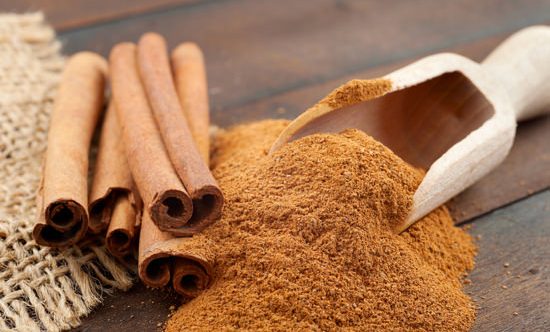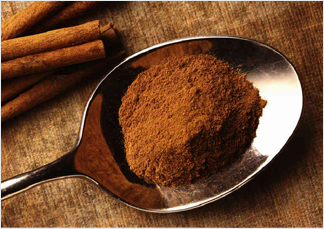Cinnamon
Cinnamon

Cinnamon is best known as a spice, sprinkled on toast and lattes. But extracts from the bark of the cinnamon tree have also been used traditionally as medicine throughout the world, and particularly in Asia.
Cinnamon is the brown bark of the cinnamon tree, which when dried, rolls into a tubular form known as a quill. Cinnamon is available in either its whole quill form (cinnamon sticks) or as ground powder. Although available throughout the year, the fragrant, sweet and warm taste of cinnamon is a perfect spice to use during the winter months.
With very low GI, cinnamon is considered as one of the most ancient and powerful herbs.
2 tsp ground cinnamon (which is approximately 5.30 grams) has fibre content of 11 %, calcium content of 5 % and has 46 % manganese and only 13 calories.
Health Benefits:
- Cinnamon is full of antioxidants and is as good as Garlic in helping to reduce and control oxidative stress
- Cinnamon is loaded with powerful antioxidants, such as polyphenols .In a study that compared the antioxidant activity of 26 spices, cinnamon emerged as the clear winner, even outranking superfoods like garlic and oregano.In fact, it is so powerful that cinnamon can be used as a natural food preservative in various food preparations.
- Cinnamon is well known for its blood sugar lowering effects. Various human clinical trials have confirmed the anti-diabetic effects of cinnamon, showing that it can lower fasting blood sugar levels by up to 10-29%.
- Cinnamon has been shown to decrease the amount of glucose that enters the bloodstream after a meal. It does this by working with numerous digestive enzymes, which slows the breakdown of carbohydrates in the digestive tract.
- Cinnamon has an ability to lower the release of arachidonic acid from cell membranes and so therefore puts it in the category of an “anti-inflammatory” food that can be helpful in lessening inflammation in various parts of the body.
- Cinnamon has been linked to reduce the risk of heart disease, by reducing the levels of total cholesterol, LDL cholesterol and triglycerides, while HDL cholesterol (the good cholesterol) remains stable.
- Cinnamon essential oils are best known for its an anti-microbial activity, and cinnamon has been studied for its ability to help stop the growth of bacteria as well as fungi.
- Cinnamon has shown an amazing ability to stop medication-resistant yeast infections. This applies to Escherichia coli bacteria and Candida albicans fungus. Studies discovered that Cinnamon Oil was one of three leading essential oils effective against Candida.
Recommended per day supply is 1/2 to 1 teaspoon (2-4 grams) of powder a day
Interactions:
If you take any medications regularly, talk to your doctor before you start using cinnamon supplements as they could interact with antibiotics, diabetes drugs, blood thinners, cardiac medicines, and not recommended for women who are pregnant or breast feeding.
Cinnamon : #My Tips

Cinnamon is one of the world’s most ancient spices, and yet still today is one of the most popular characters in the spice rack. Recently cinnamon drew more attention when a study found that cinnamon, taken as a food, could help regulate blood sugar in people with Type 2 diabetes (the more common form of diabetes).
Mix 1 teaspoon of cinnamon with 2 teaspoons of organic honey and eat this once a day in case of any coughs and colds or to boost immunity.
Combine 1 teaspoon cinnamon with 2 tablespoons honey and 1 cup low fat Greek yogurt. Serve as a dip for sliced fruit or as a dressing for fruit salad. Spoon a dollop on top of hot oatmeal, whole-grain pancakes, waffles, or granola.
Combine equal parts of cinnamon and raw cocoa (optional) Sprinkle on yogurt and fruit slices.
A mixture of 1 tablespoon of honey and 1/2 teaspoon of cinnamon in a glass of Luke-warm water is all you need. Mix it up well and drink it on an empty stomach.
This combination of foods helps improve digestion, alleviate wind & ease stomach pains.
